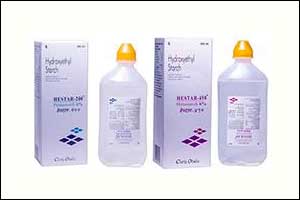- Home
- Editorial
- News
- Practice Guidelines
- Anesthesiology Guidelines
- Cancer Guidelines
- Cardiac Sciences Guidelines
- Critical Care Guidelines
- Dentistry Guidelines
- Dermatology Guidelines
- Diabetes and Endo Guidelines
- Diagnostics Guidelines
- ENT Guidelines
- Featured Practice Guidelines
- Gastroenterology Guidelines
- Geriatrics Guidelines
- Medicine Guidelines
- Nephrology Guidelines
- Neurosciences Guidelines
- Obs and Gynae Guidelines
- Ophthalmology Guidelines
- Orthopaedics Guidelines
- Paediatrics Guidelines
- Psychiatry Guidelines
- Pulmonology Guidelines
- Radiology Guidelines
- Surgery Guidelines
- Urology Guidelines
HES no longer recommended for patients of sepsis or burn due to serious risks

Hydroxyethyl-starch(HES) solutions for infusion belong to the class of medicines known as colloids.These are used for the management of hypovolaemia caused by acute blood loss, where treatment with ‘crystalloids’ alone is not considered to be sufficient. They are used as blood volume expanders to prevent shock following acute bleeding, sepsis or burns . The CMDh has endorsed the recommendation of Pharmacovigilance Risk Assessment Committee (PRAC) to suspend the marketing author is actions of hydroxyethyl-starch (HES) solutions for infusion across the European Union as a result of reported serious risks of kidney injury and death in certain patient populations.
The review of HES solutions for infusion has been carried out by EMA’s Pharmacovigilance Risk Assessment Committee (PRAC). The CMDh endorsed the suspension recommended by the PRAC due to the fact that these medicines have continued to be used in critically ill patients and patients with sepsis despite restrictions on use in these patient populations introduced in 2013 to reduce the risk of kidney injury and death. The final decision, however, will be taken by the European Commission
The PRAC reviewed results of drug utilisation studies, together with the currently available data on benefits and risks from clinical trials and observational studies and feedback received from stakeholders and experts. Based on this review, the PRC concluded that the restrictions introduced in 2013 have not been sufficiently effective.
The PRAC also explored the possibility of introducing additional measures to protect patients at risk but concluded that such measures would be ineffective or insufficient.
The CMDh has now agreed with the PRAC recommendation that, in view of the serious risks that certain patients are exposed to, HES solutions for infusion should be suspended. Alternative treatment options are available.
As the CMDh position was adopted by majority vote, the CMDh position will now be sent to the European Commission, which will take an EU-wide legally binding decision.
Information for patients
- HES solutions for infusion are replacement fluids given to patients who have lost blood following injury or surgery.
- These products are being suspended in the EU in view of the serious risks that certain patients (for example those who are very ill or have blood poisoning) are exposed to.
- Other treatment options are available for treating blood loss in the EU.
- This suspension does not apply to the use of HES in clinical trials, where patient selection is tightly controlled. Member States where trials with HES solutions for infusion are ongoing may review the way these trials are conducted in light of the outcome of this review.
- If you are in a clinical trial with HES solutions for infusion and have any questions or concerns about these products speak to the doctor who is giving it to you.
Information for healthcare professionals
- The marketing authorisations of HES solutions for infusion are being suspended in the EU because of the risk of kidney injury and death in certain patient populations, including critically ill patients or patients with sepsis. Despite contraindications introduced in 2013, drug utilisation studies show that HES solutions for infusion have continued to be used in these patients.
- Experience in clinical practice suggests that it is difficult to clearly distinguish patients who can be administered HES solutions for infusion from those who should not. In addition, some patients may become critically ill or septic while receiving the product.
- As further measures to minimise the risks are unlikely to be sufficiently effective, HES solutions for infusion are being suspended to protect patient health.
- Alternative therapeutic options are available for routine clinical practice (including albumin, gelatins and dextrans) and should be selected according to relevant clinical guidelines.
- The suspension concerns use of HES solutions for infusion in routine clinical practice, where it was found that the medicine was used in contraindicated populations; it does not apply to their use in clinical trials, where patient selection is tightly controlled. Member States where trials with HES solutions for infusion are ongoing may review the way these trials are conducted in light of the outcome of this review.
- Several clinical trials with HES solutions for infusion are ongoing; these include two studies previously requested by the PRAC in patients with trauma and in elective surgery, which is the population for which the products are currently indicated.
- For the suspension to be lifted, the marketing authorisation holders should provide reliable and convincing evidence on a favourable benefit-risk balance in a well-defined population, with feasible and effective measures to adequately minimise exposure of patients at an increased risk of serious harm.
- Healthcare professionals will be informed in writing of the outcome of the review and the suspension of the marketing authorisations of HES solutions for infusion.

Disclaimer: This site is primarily intended for healthcare professionals. Any content/information on this website does not replace the advice of medical and/or health professionals and should not be construed as medical/diagnostic advice/endorsement or prescription. Use of this site is subject to our terms of use, privacy policy, advertisement policy. © 2020 Minerva Medical Treatment Pvt Ltd